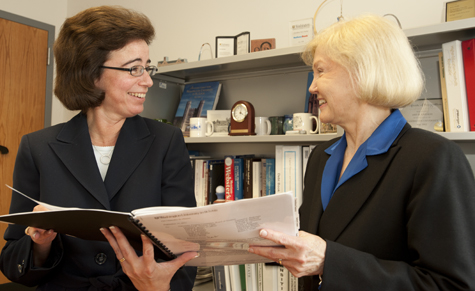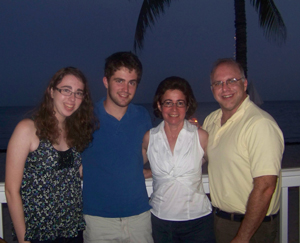
David Kilper
Amy Kweskin (left), associate vice chancellor for finance and treasurer, talks with Martha Bradley, assistant treasurer, in her office on North Campus. “Amy is a great fit for her role at Washington University,” says Barbara Feiner, vice chancellor for finance and university CFO. “She’s a team player, and she can see the big picture but also is comfortable in getting into the details in addressing issues and solving problems.”
Amy Kweskin regularly engages in what Barbara Feiner, the university’s chief financial officer, calls “a balancing act.”
As university treasurer, Kweskin works to ensure the university has enough liquidity — easily accessible assets that quickly can be converted to cash — to manage its day-to-day operations. But she also has to make sure the university is not keeping too much extra cash around, missing investment opportunities for longer-term gains.
It’s a process that is “critical to the smooth running of our operations,” says Feiner, vice chancellor for finance.
To accomplish this, the treasury team — under the leadership of Kweskin, associate vice chancellor for finance and treasurer — manages more than $1 billion in operating cash and more than $1.25 billion in external debt. Those are two huge numbers, but Kweskin and her team have a history of making the choices to find that right balance.
No time was this more evident than during the fall of 2008, when stock market plummets took the financial world by surprise. Many Americans lost their savings, jobs or both. Banks stopped lending; credit dried up.
“We had students who went from needing no financial assistance to needing full financial assistance,” Kweskin says. “A top priority was to keep those students at Washington University.”
With market volatility creating uncertainty in liquidity and important revenue streams, such as tuition and endowment payout, WUSTL and other universities across the country needed help to keep their schools operating without interruption.
Unlike many of its peers, WUSTL — due to the excellent planning, foresight and credit management by Kweskin and her team — had access to enough liquid cash and credit to emerge unscathed by the downturn. Students stayed in school, employees received paychecks, and buildings were built (albeit a little delayed), all according to plan.
Whether she is interacting with bond rating agencies to maintain the university’s excellent AAA rating or a new intern in her department, Kweskin is a pleasure to work with, Feiner says.
“Amy is a great fit for her role at Washington University,” Feiner says. “She’s a team player, and she can see the big picture but also is comfortable in getting into the details in addressing issues and solving problems.”
The cookie counter
Kweskin was born in St. Louis, but she, her mother, father and two older sisters moved to the city’s outskirts in Chesterfield, Mo., when most of Chesterfield still was farmland.
“My kids have a hard time believing that I had an apple orchard in my backyard growing up,” says Kweskin, who still lives in the area.
As a student at Parkway Central High School, Kweskin worked in the bakery at a nearby grocery store, decorating cakes, taking orders and doling out donuts.
“Every donut or cookie had a different price, and I would box them together, add up the total in my head, and write the total on the box top,” Kweskin says.
Customers would stare incredulously at the teenage math whiz behind the cookie counter.
“Sometimes they would make me redo their totals on a calculator to prove the price I had was correct,” Kweskin says. “That’s when I realized I had pretty good math skills.”
But Kweskin, a natural extrovert who enjoyed writing, had pretty good communications skills, too. After graduating high school, Kweskin enrolled at the University of Missouri-Columbia, intending to major in journalism.
But as her freshman year progressed, Kweskin realized she didn’t have the passion for journalism that her colleagues had. She moved back to St. Louis to attend the University of Missouri-St. Louis and try some business classes. Kweskin quickly discovered that her interest lay with bottom lines, not datelines.
Communicating finance
After graduating from UMSL with a bachelor’s degree in finance and marketing in 1985, Kweskin was recruited to aviation-manufacturing company McDonnell Douglas Corp.’s Fiscal Development Program (FDP). The three-year training program introduced new employees to six financial areas, with the aim at the end to match employees with the department that best complemented their strengths.
After a few stints in accounting areas, Kweskin landed a rotation in corporate financial planning and investor relations — “and I just loved it,” she says.

But when Kweskin finished her FDP, there was no spot available in corporate financial planning. But there was an opening in the treasury, a department closely related to corporate financial planning.
“In treasury, you see where the cash is flowing in and out,” Kweskin says. “You get a chance to talk with people in different divisions, trying to understand their business plans and work with them to forecast their cash needs. It gives you a sense of the total organization.
“Working in McDonnell Douglas’ treasury department was an excellent meld of my interests in communications and finance. I got into treasury and never left.”
After earning a master’s degree in business administration from Saint Louis University in 1989, Kweskin quickly moved up through the treasury office. She was named section manager of cash management in 1990 and group manager treasury in 1991.
In 1997, Kweskin found herself in the midst of a takeover bid for McDonnell Douglas by rival Boeing Co. She had a choice: continue her position in Seattle with Boeing, or pursue other opportunities in St. Louis.
“My children were very young at the time,” Kweskin says, “and I decided it would be a good time to take a few years off.”
Then a friend in banking called. An associate treasurer position had come open at Washington University — and Kweskin’s friend thought Kweskin would be perfect for the job.
Kweskin — somewhat reluctantly — submitted her resume.
But during the interview process, as Kweskin learned more about the job, it became clear both the position and WUSTL’s flexible, family-friendly atmosphere was an ideal fit. Six months after being hired as associate treasurer, Kweskin was named university treasurer, and, in July 2008, associate vice chancellor for finance and treasurer.
“During my 14 years at Washington University, I’ve worked on so many challenging projects in areas from finance and insurance to real estate and strategic planning,” Kweskin says. “There’s always the opportunity to work on something different, so each day is a fresh challenge. It keeps me energized, always facing something new.”
Seeing through the bottom line
As treasurer, like at McDonnell Douglas, Kweskin works with people from areas throughout the university, including the offices of Facilities, Quadrangle Housing, Residential Life, General Counsel and Student Financial Services (SFS).
For SFS, Kweskin and her office work behind the scenes, processing loans and managing WUSTL’s Partners in Education with Parents (PEP) financing program. PEP allows students and parents to freeze tuition and offers several payment options financed by WUSTL. It’s one of the few programs like it in the country, Kweskin says, and it usually offers students and parents better rates than the U.S. government.
Kweskin and her office play a vital role in enabling students from a variety of backgrounds to attend WUSTL, says SFS Director Bill Witbrodt.
“Amy — even with her significant financial responsibility to the university — never fails to see through the bottom line to recognize the importance of meeting the financial needs of students and their families,” Witbrodt says.
Kweskin’s work to support WUSTL students extends beyond her day job. In 2009, Kweskin joined the national board of directors of St. Louis Hillel at Washington University, an organization serving Jewish college students at universities throughout the St. Louis area. She currently serves as finance chair and oversees Hillel’s finances and investments.
The role came naturally to Kweskin, a go-to parent when it came to managing the finances of her own children’s school organizations. “With two kids almost college age — and now, one in college — it was a great opportunity to work with students and bring something to Hillel that could be helpful.”
Helpful is an understatement, says Jackie Levey, Hillel president. Kweskin provides support and direction to Hillel regarding a myriad of issues, including a major renovation of the Hillel building, Levey says.
“Amy’s guidance is invaluable,” Levey says. “Her multiple perspectives as a finance expert and parent of a current student make her a wonderful adviser in nearly everything that we do.”
“Amy always makes herself available to the organization, despite the many demands on her time,” says Denise Walsh, Hillel treasurer. “She goes above and beyond to help improve our organization.”
Fast facts about Amy Kweskin
Education: B.S., finance and marketing, 1985, University of Missouri-St. Louis; MBA, 1989, Saint Louis University
Family: Husband, Jay; son, Ben, a freshman at WUSTL; and daughter, Mia, a high school junior
Pet: Chester, a 5-year-old beagle mix adopted from the Humane Society
Favorite vacation spot: Anyplace with a beach